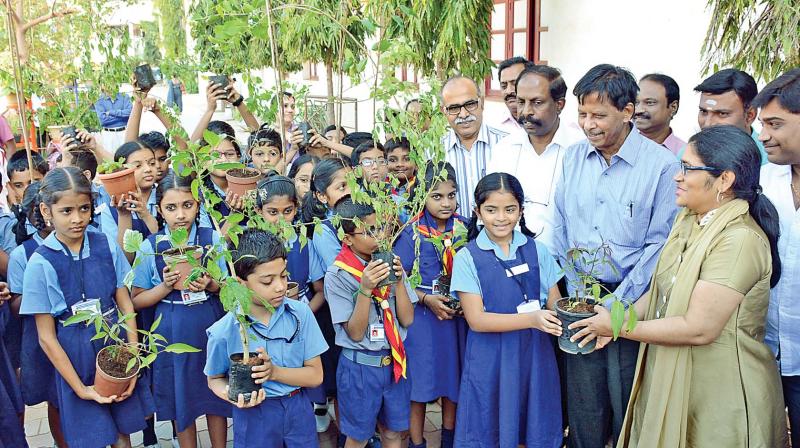Cyclone Vardah hit exotic trees most
Post-cyclone study reveals surviving indigenous trees outnumbered imported ones by 3 to 1.

Chennai: A comprehensive post-Vardah study conducted by an environmental organization in a city ward unveiled shocking results: 77 percent of the uprooted trees here are exotic and 22 percent of them are indigenous.
The Pre and Post-Vardah survey conducted at ward 176 by Nizhal by teaming up with Teems India provides solutions to illegal cutting of trees and prevent tree abuse. A visually effective, Geographic Information system (GIS) was used to categorise the species, size and status of a tree in the locality.
In Ward 176 (Adayar), where the study was conducted, 16.36 percent of the trees were damaged, a mere 9 percent uprooted, while the rest were wind-thrown.
Shobha Menon, founder of the NGO Nizhal said, “Among the most vulnerable in the locality are Copper Pod trees, followed by Elephant Ear Pod, Rain Tree, Gul Mohur and Pungam. The survey sends a message of how selection of trees, according to the location and checking on its growth is more important than planting them.”
Stressing on the need to develop a scientific urban tree management strategy, Shobha Menon said, “In the recent past, avenue trees were highly neglected. If extended to all the wards in the city, it would sensitise a lot of people on tree management.”
Explaining about the GIS application, managing director of Teems India, G.R. Ravi said, “Usage of GIS would help quantify tree population. The use of data collection and mapping devices to accurately survey trees could be done in an accurate way.”
The data after the cyclone was compared with the previous study conducted at the same ward in 2014 to learn the worst affected areas: 18th cross street, 2nd Main road, 3rd Cross Street and Karpagam Gardens. Medium sized trees at Parameshwari Nagar and Ramaswamy Avenue was among the worst affected.
Cautioning the enthusiastic residents who are on a tree plantation spree, Shobha Menon said, “Geo-space availability and tree vulnerability should be learnt before planting the trees. A mass tree-planting drive, without following the biological norms would only procure negative results.” She also called for a public-private partnership for a collective responsibility of all the stakeholders.
Tree transplantation drive picks up speed
Tree transplantation drive seems to be picking up pace in the city, which lost its massive green cover to Cyclone Vardah. Horticulturists and tree conservationists are widely sought after by the city residents, who are sensitised by the transplantation techniques through social media.
It is the high cost and largely time consuming procedure that is prompting the residents to ignore the procedure. Eminent horticulturist, B. Elango who has transplanted 15 trees in the city after the cyclone explains the riders in the procedure as he said, “It requires an elaborate study on the health of the tree. While trees like banyan and peepal can be transplanted easily, we have been facing unknown failures in doing the same for mango.”
Non-pruning of trees and poor methods of planting were the root causes of the massive tree fall, he added. “It takes a minimum of Rs 1,000 to a maximum of Rs 1 lakh to transplant trees (depending on the size). Also, the operation takes as much as six hours,” he mentioned.
Elango can be reached at 9444176934.

